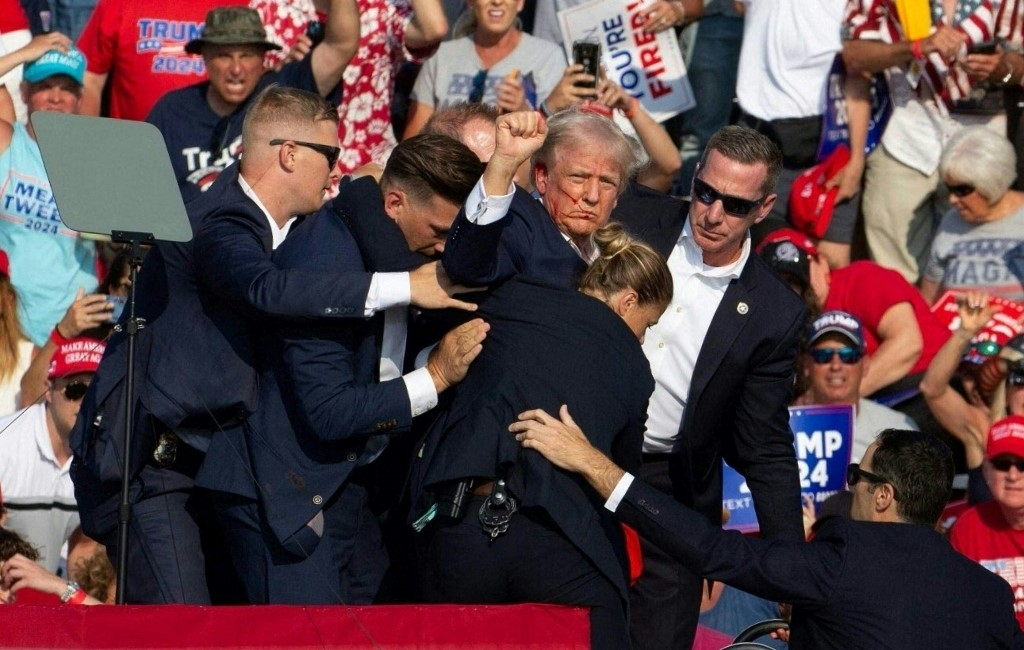Middle East reacts to Donald Trump assassination attempt

The apparent assassination attempt on former President Donald Trump on Saturday has provoked an outpouring of condemnation, even from opponents of the Republican frontrunner.
In the Middle East, national leaders largely joined in.
"I followed up the treacherous attack on former president and presidential nominee Donald Trump with concern, and I reiterate Egypt's condemnation of the incident," wrote Egyptian President Abdel Fattah el-Sisi on his Facebook page.
He hoped for the "completion of the American election campaigns in a peaceful and healthy atmosphere, free of any manifestations of terrorism, violence, or hatred".
The attack was also condemned by Turkish President Recep Tayyip Erdogan, who said he hoped those behind it would be brought to justice "in order not to cast a shadow on the US elections and global stability", while Israeli Prime Minister Benjamin Netanyahu said he and his wife would pray for Trump's "safety and speedy recovery".
New MEE newsletter: Jerusalem Dispatch
Sign up to get the latest insights and analysis on Israel-Palestine, alongside Turkey Unpacked and other MEE newsletters
Palestinian President Mahmoud Abbas, who has not enjoyed cordial relations with Trump in past, also condemned the attempted assassination, saying in a statement that he "reaffirm[s] the positions of the State of Palestine, which has always rejected violence, terrorism, and extremism, regardless of its source".
Not everyone, however, was so supportive or magnanimous.
The Telegram and X accounts for Sabereen News, an outlet affiliated with the Iran-backed "resistance" groups in Iraq, on Sunday posted a picture of a bleeding Trump with the caption: "Today terror has entered their fortified palaces."
اخبروا من قال أن العالم سيكون أكثر أماناً بعد قتلهم
— صابرين نيوز - Sabereen news (@sabreenS11) July 14, 2024
قد دخل اليوم الرعب قصورهم المحصنة#ترامب pic.twitter.com/fYBCgEZWQx
One of Trump's last significant acts while in office was ordering the assassination of Qassem Soleimani, former head of Iran's Al-Quds Force.
The 2020 attack in Baghdad, hailed by Trump as a "flawless precision strike", also killed Abu Mahdi al-Muhandis, a senior Iraq government official and head of the irregular Popular Mobilisation Forces.
Iranian journalist and former diplomat Amir Mousawi also implied the attack was "divine" retribution for the killing of Muhandis and Soleimani, tweeting "soul for a soul and an eye for an eye" and suggesting Netanyahu would be next.
In a response on Monday, influential Iraq Shia leader Muqtada al-Sadr said the incident had punctured the illusion of the US as a beacon of democracy and an inspiration to the world.
“This incident was a coup de grâce in the body of their democracy, freedom, peace, and security... and perhaps it was the beginning of something worse and more sinister than that," he wrote on X.
"Rather, it gave the world a shameful image of that [superpower], and America will no longer be an example for humanity from now on."
Others pointed out the irony of Israeli officials' condemnation of the Trump attack just a day after their own attempted assassination of a senior Hamas leader in Gaza:
Consecutive tweets by the Israeli Foreign Minister. You cannot make this shit up… pic.twitter.com/cE7vX2b9Qc
— David Andress (@ProfDaveAndress) July 14, 2024
And as night follows day, numerous social media users also attempted to link the assassination to a range of Middle Eastern factions, with some in the US and Israel claiming the shooter was a supporter of Hamas, some blaming the Israeli Mossad intelligence agency, and some Turkish users saying he was a supporter of the Kurdistan Workers' Party, or PKK.
While Trump's arch-nemesis Iran has yet to comment on the shooting, a number of Trump supporters tried to link the Islamic Republic to the shooting by citing a statement by an Islamic Revolutionary Guard Corps commander last year in which he said they "hope we can kill Trump, [former Secretary of State Mike] Pompeo, [former US general Kenneth] McKenzie and the military commanders who gave the order" to kill Soleimani.
So far however, despite speculation and conspiracy theories, the motivation of the shooter has yet to be determined.
Middle East Eye delivers independent and unrivalled coverage and analysis of the Middle East, North Africa and beyond. To learn more about republishing this content and the associated fees, please fill out this form. More about MEE can be found here.

